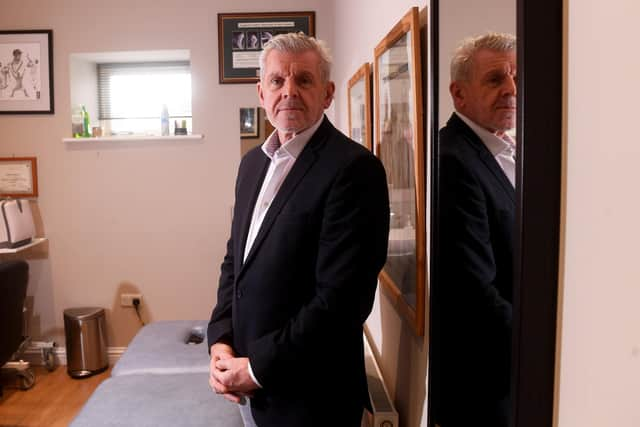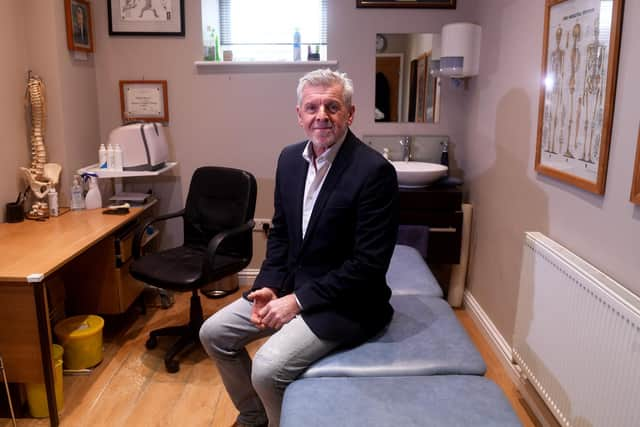Wayne Morton exclusive part 1: 'We were branded a "cancer". How can that happen?'
Syd Lawrence, the black Gloucestershire fast bowler, is having bananas thrown at him by a drunken moron. Morton goes to confront the yob, puts his neck on the line in spite of the risk.
“When I get there, it’s not just one person, but about ten drunken lads,” he remembers. “It’s a fractious, light-the-blue-touchpaper moment. Before I know it, two police officers have dragged me out of the crowd. It’s made out that I’m the one who is causing the trouble.”
Advertisement
Hide AdAdvertisement
Hide AdFour years later, Morton - by then also the England physiotherapist - is on tour with the national side in South Africa. He is walking around the boundary with Phil DeFreitas, another pace bowler of colour. DeFreitas, a good friend, is being abused by another group of morons. Once again, Morton jumps into the crowd, puts his neck on the line.


“It’s ugly stuff – it’s racism,” he says. “I’d never tolerate that crap. I’d always call it out. I’ve never found it difficult to speak the truth, or to pull up people who are acting incorrectly.”
Fast forward just over a quarter-of-a-century and this is the man who, along with some 20 staff all told, lost his job as Yorkshire’s head of sports science and medicine in 2021, having been tarred with the brush of being a racist.
Not just a racist, but, as the journalist George Dobell told a hearing of the Digital, Culture, Media and Sport (DCMS) select committee the following year, and also tweeted, a “cancer” that “you don’t negotiate with”, referring to those backroom staff who signed a private and confidential grievance letter to the previous board (purposely and proudly orchestrated by Morton) that not so much questioned as rubbished Azeem Rafiq’s version of life at the club. That letter, leaked to the Daily Telegraph, has been cited as evidence of a toxic culture in which the only tactic that occurred to the troglodytes therein was to attack the whistleblower.
Advertisement
Hide AdAdvertisement
Hide AdWhat Morton thinks about Rafiq and Dobell, who have combined in a book which Morton believes should be in the section marked “fiction” if it finally appears, as scheduled, next month, cannot be repeated in a family newspaper.


The sacked staff all felt that they went out of their way to help Rafiq, while of Dobell’s cancer slur Morton says: “I don’t know George Dobell. I’ve never met him in my 38 years in cricket. I’ve never spoken to him or had any interaction with him. I think that’s the same for all the sacked staff. And yet he decided, for whatever reason, that he would become the mouthpiece for Azeem Rafiq.
“Not only has he tweeted absolute drivel, but to be called a cancer that you don’t negotiate with, when anyone who has suffered cancer or lost a relative to cancer knows what that involves, to be called that by someone under parliamentary privilege, is one of the most disgusting things that could ever happen. How can it actually be allowed to happen?”
Morton, 63, is talking at the end of a bitter two-year legal fight with Yorkshire that ended with the club agreeing an out-of-court settlement with him and the staff subcontracted through his Pavilion Physiotherapy Clinic, including Kunwar Bansil, the British Asian lead physiotherapist. All were sacked without investigation or proper process; they didn’t even get a reply to their grievance letter.
Advertisement
Hide AdAdvertisement
Hide AdIt was Bansil’s intervention, with the help of Mike Atherton in The Times, that tipped the scales of this story two years ago, giving voice to a vastly different version of events. For Morton, whose association with Yorkshire goes back to 1984, a perhaps appropriate date given Orwell’s famous cautionary tale, there remains a faintly surreal air to affairs.


Not least as he reflects on his own letter of dismissal - one signed by Paul Hudson, the then acting chief executive, a man he thought was a friend, a letter which accused him, among other various subsequently withdrawn allegations that might have embarrassed the Marquis de Sade, of having “engaged in unprotected sexual activity and intercourse with a prostitute” in the dressing room some seven years earlier.
Morton was also accused of having had, some 14 years previously, “a sexual relationship with a senior employee at the club which was at odds with his professional position as an independent key medical supplier to the club”, further emphasising the lengths Yorkshire went to in order to sack him.
When the prostitute allegation entered the public domain through the various stages of his court case, one which took him to the edge emotionally and financially, there was much astonishment among his many friends and former colleagues, some of whom were quick to get in touch to offer their sympathies.
Advertisement
Hide AdAdvertisement
Hide Ad“Prostitute?” they queried. “Good grief. Everyone knows it was a stripper, Wayne. How dare they say that about you.”


Morton tells the joke against himself because, as he puts it, “if you dish out banter - if you can still say ‘banter’ - then you’ve got to be prepared to take it”.
Without ‘gallows humour’ - perhaps the only way to treat such a sad situation - Morton might have struggled to get through the last two-and-a-bit years, which took him psychologically to places unaccustomed.
“The worst day was when the court released all those scurrilous accusations from Yorkshire. That brought me to my knees. It was the prostitute headlines and all of that coverage. That, in the village I live in, brought it home.
Advertisement
Hide AdAdvertisement
Hide Ad“It brought it home, actually, when I was sitting in a little cafe and I saw some people sitting across, vaguely that I knew, and this woman was going: ‘That’s him, there. That’s him.’ Of course, it had all been in the papers the day before.
“To read that in the papers - and your kids obviously ask you questions, because I was married at the time… I think that’s what tipped me into what I’d call a bit of a mental depression. I’d never sought help for mental health in my life, but I needed to then.”
Looking well when we meet, fit and robust, a man whose ready smile and gregarious demeanour puts a brave face on - but never completely conceals - the pain of his treatment, Morton continues: “To be wrongly accused…I think that’s one of the worst things in life.
“Yorkshire simply wasn’t like that. There wasn’t all this racism going on. If an individual owns up to having used a racist slur once or twice, does that mean that you then castigate the entire organisation? And how do you monitor that? It was never mentioned at the time. So when did this happen? How come the other Asian players said that they never heard or saw anything? How come those players went on and had great careers?
Advertisement
Hide AdAdvertisement
Hide Ad“The Squire Patton Boggs investigation report says several times that Rafiq was a non-credible witness. That report has never been released. The DCMS only published his uncontested employment tribunal witness statement, after one of the politicians had said simply, ‘We believe you’. What sort of investigation was that?”
Legal cases are expensive, time-consuming and draining. In addition to the stigma of the charges laid, the long months took a toll.
“The case was eating my money. Litigation is phenomenally expensive, and you see no light at the end of the tunnel. I was in a bit of a fog. I went to my GP. I wasn’t sleeping. My sleep pattern was appalling. I thought perhaps I’d just ask for some sleeping tablets.
"My GP was so lovely. I went in and started to talk and then, inexplicably, I kind of broke down. She was very good with me, very patient. She organised some help.
Advertisement
Hide AdAdvertisement
Hide Ad“People don’t want to sometimes accept that you do need help, and I would organise help for anybody at the drop of a hat, but I never felt that I needed it myself because you don’t recognise where you get to, the point where emotionally you can no longer cope.”
For Morton, what turned things around was, as he puts it, “a realisation of what the club was actually trying to do to me”.
“They were trying to break me, financially and emotionally. They were delaying every deadline in the court case, leaving me continually on hold. There was no one I could trust there. The loss of some good friends throughout the process as well… that was very hard. The realisation of what fear and money can do to some people’s integrity.
Advertisement
Hide AdAdvertisement
Hide Ad“I lost respect for people. Paul Hudson; he’d been a friend. He signed the letter of dismissal, even though he knew it contained rubbish. One of the claims was that I’d taken over aspects of the cricket without anyone asking me to, but it was him personally who’d asked me.
“Also Darren Gough (who came back as director of cricket) and (board member and former Yorkshire player) Neil Hartley. They’d been my friends for 35 years. I spent a lot of my cricket time with Neil Hartley. I grew up with him. Darren Gough… I was like his second dad. I sang his praises, looked after him at every moment.
“Admirable as a cricketer, I thought he was amazing. What he did to Yorkshire and the rest of the 20 staff was, in my opinion, despicable. He knew those 20 sacked staff were not racist in any way, shape or form. He profited as his friends and former colleagues suffered; ironically, he’d been in that supposedly toxic dressing room himself as a player.”
According to Morton, three of the sacked staff were suicidal. Others connected to the case have had similar thoughts, including family members of the accused, inevitably the unseen victims. One of the most moving stories told to this correspondent was when a member of Morton’s staff confided that he’d taken down some photographs at the practice where he worked, happy memories of his time at Yorkshire, just in case his patients made the connection and thought that he was racist. That is how bad it got for those men at the height of the storm, one in which due process and due diligence were habitually absent.
Advertisement
Hide AdAdvertisement
Hide AdA highly intelligent, thinking man, Morton poses a fascinating question: how do you prove that you’re not a racist?
“Imagine that you’ve been accused of racism. It’s about the worst criticism you can face. Then think of how you’re going to attempt to defend that without sounding racist. It’s impossible. You can’t say something like, ‘Well, loads of my friends are ethnic minority.’ You just get pilloried.”
Morton has received numerous messages of support from people of colour within the game, men whose identity he prefers to protect. Some years ago, an endorsement of his character came from perhaps the greatest of them all - Sachin Tendulkar, Yorkshire’s first overseas player.
“The help which I got from Wayne Morton is absolutely unforgettable,” wrote Tendulkar of his season with the club in 1992, one year after Morton had courageously jumped into a Scarborough crowd and confronted the very thing of which he then stood accused – of racism, of being a “cancer” that “you don’t negotiate with”.